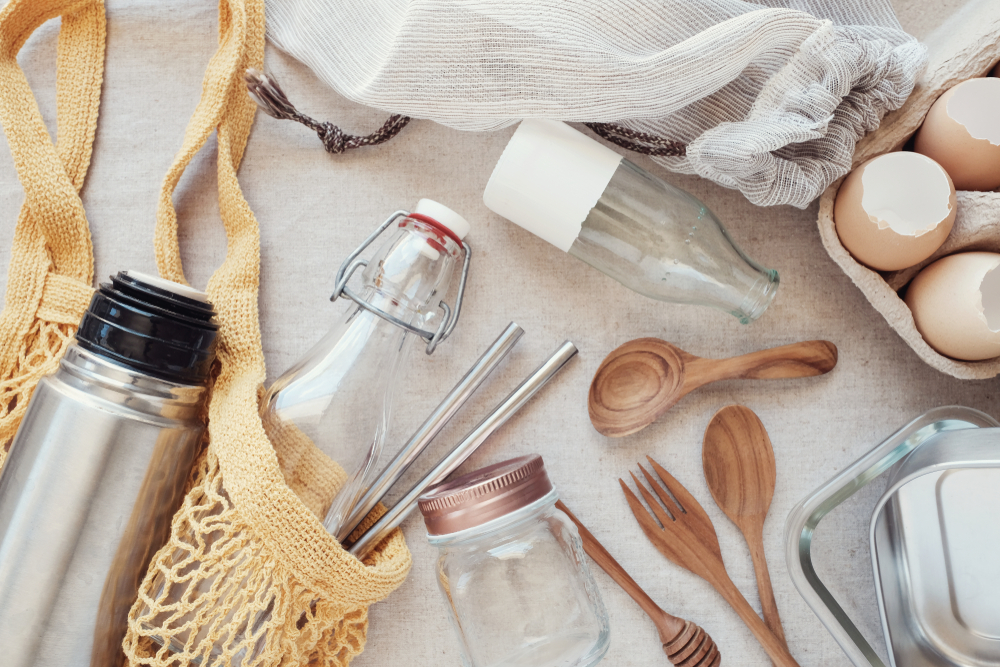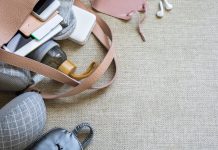Want to be a part of one of the largest movements to curb plastic pollution? Plastic Free July got its start in 2011, when Rebecca Prince-Ruiz and a few others in her Western Australia community decided to ditch plastic for an entire month. Momentum has been built ever since, and in 2020 more than 326 million people around the world decided to join the challenge!
Let’s help make that number grow even more in 2021! Here are a few simple swaps you can make to celebrate Plastic Free July, wherever you are.
Celebrate Plastic Free July with These 7 Simple Tips to Reduce Your Single Use Plastic Usage
1. Always have reusable grocery bags on hand
Plastic bags have been the top single-use plastic villain in recent years—and for good reason! They take about 1,000 years to decompose, pose risks for wildlife and ecosystems, and release toxins and microplastic as they degrade.
By 2050, it’s expected that our oceans will be filled with more plastic bags than fish!
Like other single-use plastics, they’re also made from fossil fuels. Americans consume roughly 100 billion plastic bags every year, which requires about 12 million barrels of oil.
Now it’s easy to see why a simple swap like having reusable grocery bags at the ready can make such a positive impact! Keep yours in your car, your purse, or hanging by the front door. They’re sure to come in handy!
2. Use bars in the bathroom
Let’s do away with bottles, and bring more bars into our bathroom. Sure, we’re all familiar with bars of soap, but now we can find a bar form of nearly all of our bathroom essentials—shampoo, conditioner, lotion, and even deodorant!
Look for those that are wrapped in compostable or recyclable paper, so that you can have a totally plastic-free shower experience.
3. Say ‘buh bye’ to plastic water bottles
If you’ve been considering buying an eco-friendly water bottle, Plastic Free July is the time to do it!
According to Harvard University, plastic water bottles require even more fossil fuels than plastic bags—17 million barrels of oil, to be exact! While they can be recycled, the vast majority end up in landfills or incinerators, again releasing harmful chemicals into our air and environment.
They’re also roughly 3,000% more expensive than filling up a bottle at home, may contain BPA and estrogen-like compounds, and generally contain tap water and its common contaminants!
To save our planet and your health, consider a water purifier—especially one that’s certified to NSF standards to remove 83 contaminants, like lead, chlorine, nitrates, fluoride, and PFAs.
4. Zip up single-use plastic storage bags once and for all
They’ve become essential in lunch bags, snack packs, and kitchen cupboards, but we should reconsider our obsession with plastic storage bags. There’s a better, safer alternative: silicone storage bags.
Silicone is free of dangerous ingredients like phthalates, lead, BPS, and BPA. Bags made with it are reusable, easier to use, and can be stored in the freezer or used in the microwave.
5. Bring more bamboo into your home
When in doubt, consider bamboo.
While it behaves like a tree, bamboo is a fast-growing grass that doesn’t require fertilizers or pesticides to grow. It can reach maturity in just a few years and it absorbs a tremendous amount of carbon dioxide from our atmosphere!
This makes it a much better material for many different products, like straws, reusable on-the-go cutlery, toothbrushes, dishes, serving trays, and more!
6. Clean up your cleaning routine
If you’re like most people, you’ve probably got a cleaner for everything—sinks, tubs, floors, glass, countertops. You can simplify and make your weekly cleaning spree more sustainable by making your own cleaning solutions (which can be as simple as white vinegar and baking soda) and reusing containers you’ve already got to store them.
You can also make a switch from plastic-based sponges, brooms, and mops to natural loofahs, and cleaning products made with natural materials like bamboo, cotton, and wool. These materials are better for our planet and tend to last longer, too.
7. Dress naturally
This may come as a surprise but what you’re wearing is likely made with plastic. In fact, around 60% of our clothes contain plastic!
Materials like nylon and polyester are found in many garments. In some cases, this is bad for our bodies, in all cases, this is bad for our planet. Plastic-based clothes release microplastics, up to 700,000 in each load of laundry! These make their way into waterways, where fish consume them for food.
Not only does this harm wildlife, but these microplastics can eventually make their way back into our mouths (part of the reason we eat a credit card’s weight in plastic every single week!).
Use a Guppy Friend ball to capture microplastics in the washer, and try to make a swap to natural and plant-based semi-synthetic fabrics like cotton, linen, hemp wool, lyocell, and modal.
Do Your Part this Plastic Free July!
There’s no time like the present to play a role in protecting our planet, and this July makes for an excellent time to start making some changes. At AquaTru, we also want to do our part—which is why our countertop water purifiers (and you!) have helped to prevent half a billion single-use plastic bottles from ending up in landfills and waterways! Help us make that number even higher!






